
Dental Implants – Falls City, NE
Complete Your Smile with Implant Dentistry
Are you missing or on the brink of losing one or more teeth? Few restorative services offer the same results as dental implants in Falls City, NE. This service combines custom-made restorations, like crowns, bridges, partials, and full dentures, with small implant posts made of titanium that serve as prosthetic tooth roots. As a biocompatible metal, titanium bonds with the bone tissue in your jaw to preserve it and create a firm foundation for your new smile. Keep reading to learn more about this truly innovative replacement option or contact us today to learn more!

Why Choose Kobza Dental for Dental Implants?
- Implants Placed and Restored Entirely In-Office
- High-Quality, Customized Restorations Available
- Modern Office with Advanced 3D Imaging Technology
What Are Dental Implants?

Dental implants are arguably the most impressive tooth replacement solution available. Thanks to their unique placement method directly into the jawbone, they’re capable of fully restoring lost teeth in terms of look and feel! The treatment utilizes special, biocompatible titanium posts that are capable of healthily fusing with your jawbone. They’re topped with durable, realistic-looking replacement teeth that ensure virtually all oral functionality is regained. Compared to traditional restoration solutions like bridges or dentures, dental implants vastly outperform them in terms of overall capabilities, and they can last for much longer, up to several decades.
The 4-step Dental Implant Process

Our team will discuss your dental implant surgery options based on your unique dental needs, such as the number of teeth missing and the location in the mouth. In any case, there are mainly four main portions to the entire process. We’ll go over every part of your treatment plan so that you know exactly what to expect. Until then, here’s a brief look at the multi-step dental implant process.
Initial Dental Implant Consultation

You’ll first undergo an initial consultation with Dr. Kobza so he can evaluate your situation and oral health before developing a treatment plan to rebuild your missing teeth. Our team will need to ensure that you are free of any underlying or growing issues in your mouth, such as gum disease, decay, or infection—complications that could risk dental implant failure later on. Your jawbone will also need to have enough volume to support the titanium posts. This means you may require certain preliminary services like periodontal treatment, bone grafting, or even tooth extraction to get you prepared for the procedure. If dental implants are a viable solution for you, we can move on with the surgical portion of the process.
Dental Implant Surgery

At Kobza Dental, we can perform the entire dental implant procedure in the office, meaning you won’t have to visit separate practices to receive treatment. Firstly, you’ll be given local anesthesia so that you’re pain-free during your appointment. Once you’re comfortable and your mouth is numb, Dr. Kobza will create tiny incisions in your gums to reveal the jawbone where he’ll place your metal posts. After each implant is strategically placed in its preplanned position, we’ll suture your gums closed around them before placing protective dental caps on them for your healing phase.
Dental Implant Osseointegration & Abutment

Your recovery will be essential for your treatment plan, as this is when osseointegration must happen for your dental implants to work. This is the process of the jawbone fusing with the metal posts and creating the optimal stability that this treatment is famous for. Your healing period might take around 4-6 months depending on your oral health and the number of implants you receive. After you’ve fully recovered, you’ll return to us to receive your abutments—metal connector pieces that are meant to link your restoration to your posts.
Delivery of Dental Implant Restoration(s)

Once your gums have healed from placing your abutments, you’ll come back to our office to receive your final restoration(s). Our team will fit your crown, dental bridge, or denture to your post(s) and then verify that your bite is correct and that you’re happy with the results. If so, you’ll be free to leave with your brand-new smile. We’ll also provide you with aftercare instructions so that you can make the most of your results for many years to come.
Benefits of Dental Implants

Dental implants are becoming more and more popular! In fact, over 500,000 implants are placed every single year. Thanks to their unique placement inside the jawbone, this modern tooth loss solution can provide numerous benefits that you can’t get from traditional dentures or dental bridges. Dental implants can dramatically improve your confidence, health, and quality of life!
Day-to-Day Benefits

Dental implants shouldn’t feel out of the ordinary after they heal. They should feel just like your natural teeth do. You may even forget that they aren’t your real teeth. Here are some benefits that you can experience every day:
- Increased Bite Force: Your bite force can be replenished by 90% or more! This is a lot more than what you can get from dentures or dental bridges.
- Easy to Maintain: Caring for dental implants is very similar to taking care of your natural teeth. Remember to brush twice, floss, and rinse with mouthwash every day. Continue seeing your dentist every six months for regular cleanings and checkups.
- Increased Confidence: It’s important to feel great about how you look. Tooth loss can get in the way of this. By replacing your missing teeth with implants, you can smile with confidence again!
Health Benefits

Dental implants can have a positive influence on your health! Here are just some of the ways that your entire body can benefit:
- Prevents Bone Loss: When you are missing teeth, your body will eventually begin to reabsorb some of your jawbone, causing it to shrink. Dental implants stimulate your jawbone through regular chewing, therefore preventing bone loss.
- Improved Dental Health: Dental implants have the ability to reduce your risk of cavities, gum disease, infections, and tooth loss!
- Better Overall Health: Having great dental health will have a positive impact on the well-being of the rest of your body. It can even reduce your risk of serious health problems, including diabetes and heart disease.
Long-Term Benefits

Dental implants cost more than traditional dentures and dental bridges. However, they are an investment in the future of your smile! Here are some of the benefits you will be able to experience for many decades down the road:
- Save Money: You don’t need to stock up on adhesives or soaking solutions. You also don’t have to worry about paying for routine repairs and replacements.
- Long-Lasting: Dental implants can last for many decades or even the rest of your life if you are caring for them properly.
- Success Rate: Dental implants have an incredible success rate of over 95%! You are highly unlikely to experience a dental implant failure.
Who Dental Implants Can Help

Dental implants are almost always a great solution; assuming a patient has sufficient jawbone density and adequate oral health, implants can be used to restore pretty much any number of missing teeth, from just one tooth to both full arches. Here’s a closer look at how they can be situated to assist patients with different circumstances.
Am I a Good Candidate for Dental Implants?

Most adults with missing teeth make excellent candidates for dental implants. However, certain factors can contribute to the success of the procedure, such as:
- Excellent oral hygiene habits
- Healthy gum tissue
- Sufficient jawbone volume and depth
To find out if dental implants are the best tooth replacement solution for you, schedule an initial consultation with Dr. Kobza. As a member of the International Congress of Oral Implantologists, he has the experience and expertise to evaluate your teeth and determine the best treatment to restore your smile!
Missing 1 Tooth
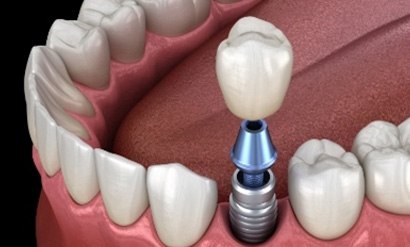
A single-tooth implant is a small titanium cylinder that serves as a replacement for the root of a missing tooth. Following the placement surgery, the implant forms a strong bond with the bone around it. Next, Dr. Kobza places an implant-retained crown on top of the implant. This type of restoration functions just like a natural tooth and has the potential to last for 30 years or longer if it receives proper care. Although an implant tends to cost more than a fixed bridge, its superior longevity may make it a wiser investment.
Missing Multiple Teeth
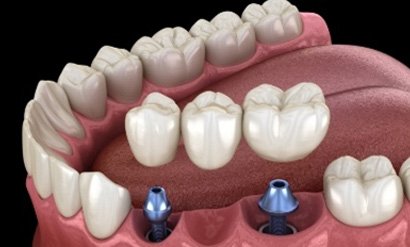
When two or more teeth have been lost in a row, an implant-retained bridge can serve as a wonderful solution that restores the ability to eat, speak, and smile with ease. This method can be fixed or removable, depending on your needs and preference.
Missing All Teeth
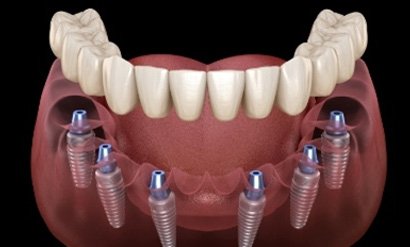
Patients who are missing a complete arch of their teeth might struggle to find a full denture that fits as securely as they’d like. Fortunately, dental implants can provide a stable solution that doesn’t slip and slide around your mouth. A strategic number of implant posts can be used to completely secure the prosthetic teeth.
Understanding the Cost of Dental Implants
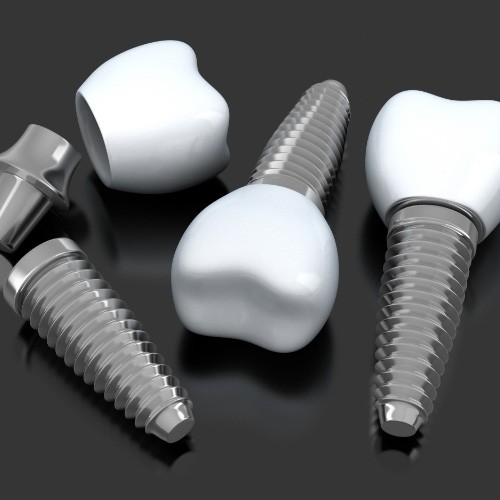
One of the most common questions we hear from patients about dental implant tooth replacement is “How much does it cost?” The answer is often frustrating for patients to hear since it’s usually something along the lines of “It depends.” This is because many factors influence the cost of dental implants. Some of these factors include:
- Preparatory procedures like tooth extraction or bone and soft tissue grafts.
- Sedation services to ensure comfort and relaxation throughout the treatment.
- Complications during or after treatment that require further care.
Before getting dental implants, Dr. Kobza and his team will walk you through every step of the process and any potential cost factors, so that you fully understand what you’ll end up having to pay.
Average Cost of Dental Implants
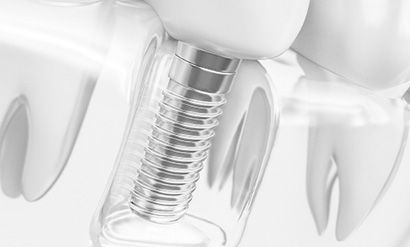
Patients can pay anywhere between $500 to $2000 for each individual dental implant post. The cost depends in large part on the material used to create the implant, the manufacturer that produces the implant, and the size and type of implant post. In addition to this, there is also the price of the tooth replacement prosthetic to consider. To replace a single missing tooth, a patient will pay about $3000 on average. The cost of more advanced restorations will increase from there.
Dental Insurance & Implants
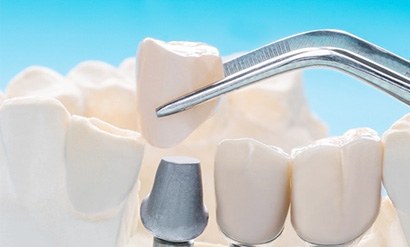
Dental insurance plans do not usually cover the cost of the implant post and surgical placement. However, plans will still cover part of the cost of the replacement tooth or teeth for most patients. We will be happy to work with you to maximize any dental insurance coverage you may receive to ensure your treatment is affordable.
Learn More About Dental Insurance
Financing Your Dental Implant Restoration

The out-of-pocket costs of dental implants can range anywhere between $2,000 and $20,000. In rare cases, the entire treatment cost may be even higher. It’s important to understand that you’re not paying for a restoration that will last between five and ten years like other tooth replacement prosthetics. You’re paying for a permanent tooth replacement solution. The added time and cost on the front end will lead to a lifetime of healthier smiles.
If you do need help covering the out-of-pocket costs of your treatment, the Kobza Dental team will be happy to work with CareCredit to provide you with a low-to-no-interest financing plan. We will do our utmost to make your dental implant-supported tooth replacement affordable.
Dental Implant Technology
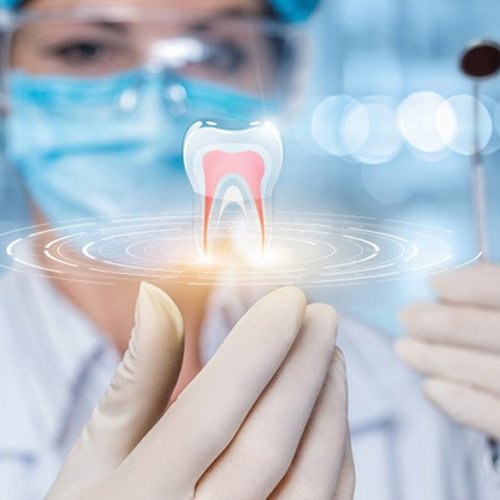
Here at Kobza Dental, we’re excited to sport some of the latest and greatest advancements and equipment in dental technology, solely with the purpose of enhancing the level of care we’re able to provide for you. Here’s a closer look at some of the tools we can use to ensure that your dental implants are placed with unmatched precision and comfort.
3D Cone-Beam Imaging/ 3D CT Scanning
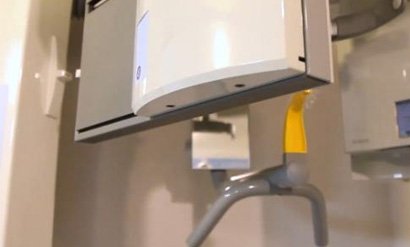
Certain treatments require a fair amount of planning before they can be completed, including complex ones like dental implant placement. Part of the planning process for dental implants is capturing extremely detailed, 3D images of your mouth and jaw, as well as the underlying structures like bone tissue, blood vessels, and nerve pathways. With the 3D CT/Cone Beam Images available in our office, we can quickly capture a detailed cross-section of your mouth and jaw. This makes the placement of your future dental implants more predictable, which ensures that your surgery is as successful as possible.
Advanced Dental Implant Procedures

The dental implant process isn’t exactly the same for everyone. Some patients might require advanced procedures such as bone grafting or a sinus lift to ensure the success of their new teeth. Depending on your unique circumstances, we might have to refer you to a trusted oral surgeon so that you can receive the treatment you need. Here’s a look at some of the advanced procedures that dental implant patients can potentially require.
Bone Grafting
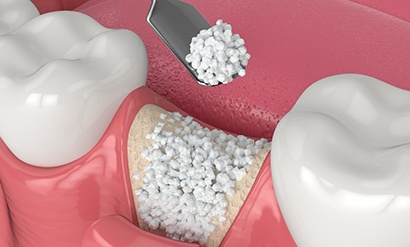
If your teeth have been missing for a while, your jaw might lack the bone density needed for dental implants. Luckily, in many cases, this issue can be corrected with bone grafting. This procedure involves opening the gums and applying grafting material to the areas of the jawbone where deterioration has occurred. Said material is typically bone tissue taken from a different part of your body.
After about 3 to 9 months, your mouth will have recovered from the bone grafting procedure, and your jaw will be ready to receive the dental implant posts.
Sinus Lift
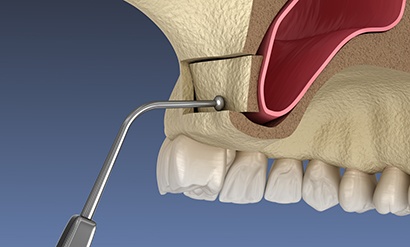
Replacing the upper molars with dental implants can be tricky. Not only does there tend to be less bone density in that part of the jaw, but the sinus cavity could potentially be located too close to where the implant posts need to be inserted. As such, if you have lost an upper molar, you may require a sinus lift before you can be considered a dental implant candidate.
For this procedure, an opening is made in the jawbone. The membrane of the sinus cavity is pushed upward to create an empty space where grafting material can be applied. Once said material is in place, the gums are sutured shut.
After recovering from a sinus lift (which often takes between 4 and 12 months), your upper jawbone will be thick enough to receive dental implants without damaging the sinuses.
Ridge Expansion
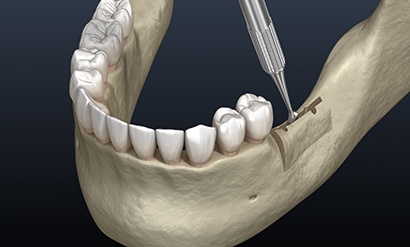
Sometimes the jawbone might simply not be wide enough to accommodate dental implants. This type of situation calls for a ridge expansion, which involves separating the ridge bone (the part of the jaw that supports the teeth) into inner and outer parts so that grafting material can be applied between them. The ultimate result of this treatment is a wider jawbone that can support dental implants without issue.
PRP/PRF Treatment

To help ensure that the healing process goes as quickly and smoothly as possible, patients can potentially receive PRP/PRF treatment after dental implant placement. PRP is short for platelet-rich plasma while PRF stands for platelet-rich fibrin. Both substances can be created by placing a sample of your blood in a centrifuge.
If PRP or PRF is applied to the site where dental implant surgery was performed, it will help the mouth heal at a faster rate. It can also reduce the risk of an infection occurring during your recovery.
Dental Implant Post-Op Instructions
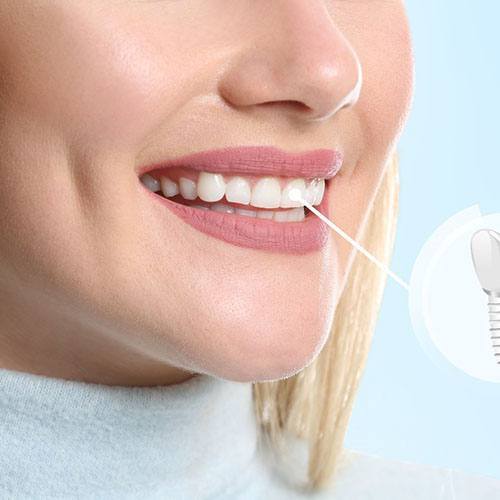
After treatment from Dr. Kobza , you’ll need a little time to adjust to your new teeth. Luckily, our team here at Kobza Dental can help you to successfully navigate your post-op period. By following these guidelines, you’ll know exactly what to expect from the recovery process, the normal range of symptoms, and how to best ensure that your new smile heals without issue. Still, don’t hesitate to give us a call if you’re experiencing intense pain or any strange side effects that aren’t mentioned here.
What to Do Directly After Dental Implant Surgery

Once your implants are placed, you must ensure that your gums heal properly. As such, you should leave the blood clots alone as they form in order to ensure a smoother healing process. To that end, keep these guidelines in mind:
- Don’t spit. Instead, use tissues or simply swallow your saliva.
- Don’t drink from straws. Pursing or sucking with your lips could dislodge the blood clot.
- Don’t smoke tobacco for at least the first day of recovery.
- Keep your fingers and tongue away from the surgical site.
Common Side-Effects When Recovering from Dental Implant Placement

You’ll likely feel some side effects for a few days after placement. Thankfully, these effects are often temporary and should subside within time; if they don’t, let us know at once!
- Mild Discomfort: The surgical site might end up aching a bit. You can take over-the-counter pain relievers such as ibuprofen to address this discomfort.
- Swelling: The area near the surgery might swell over the first 72 hours, potentially lasting for up to a week. You can help these symptoms by using cold or warm compresses.
- Intermittent Bleeding: Bleeding could occur off and on for a few days. Fortunately, it can be lessened with gauze and light pressure.
Dietary Guidelines After Dental Implant Surgery

Your new implant(s) will be sensitive for a few days following surgery, so it’s best to stick to a soft-food diet. In particular, try to stick to softer foods including items like:
- Mashed potatoes
- Scrambled eggs
- Yogurt and pudding
- Cooked pasta and rice
- Smoothies and protein shakes
- Ice cream
You should also avoid biting into particularly hard or crunchy foods and avoid chewing directly on the side of your mouth that’s received the implant. Once you’ve given your mouth a chance to heal and you’re feeling up for it, you can begin returning to your usual diet; just make sensible choices!
Post-Op Health & Oral Hygiene

Of course, you still need to clean your mouth even as it heals. Given that fact, you should keep practicing daily oral hygiene — just make some slight adjustments as you do. For instance, brush your teeth as usual on the day after surgery. However, exercise caution when near the surgical site(s). Similar concerns apply to mouth rinses. To reduce inflammation, rinse your mouth two or three times daily with salt water. You could even use a prescription mouthwash to assist with this but be sure to avoid brands that contain high alcohol content.
What to Do After Your New Teeth Are Attached

Once your new crown, bridge, or denture has been attached to your implant, you might feel some slight sensitivity in your gums; however, this symptom is easy to manage with pain medication. Other than that, you won’t face many hurdles and there shouldn’t be any excess swelling, bleeding, or extensive recovery. Before you know it, you’ll be grinning widely from ear to ear!
Dental Implant Failure & Salvage

In most cases, dental implants tend to boast a success rate of 95% or more, even 10 years after being placed. Even so, your results still have a very slight chance of failure. Whether you’ve had your new pearly whites for several weeks or a few years, if you notice problems or complications with them, you’ll want to notify our team about your condition. We’ll be able to provide salvage treatment to maintain your new teeth so you can make the most of them for as long as possible.
Learn More About Dental Implant Failure & Salvage
Maintaining & Caring for Your Dental Implants

Many experts consider dental implants the gold standard for replacement teeth for good reasons. They provide many unique advantages over alternatives like dentures and dental bridges, but only if you take good care of them! If you’re not careful, you might indulge in habits or behaviors that could lead to their failure. Thankfully, implementing a few changes to your daily routine can potentially help you make the most of your prosthetics for the rest of your life!
Continue reading to learn more about how to maintain your dental implants, and feel free to contact us for more information.
Make Oral Hygiene a Priority

Although your dental implants are comprised of materials that cannot get cavities, it’s still necessary to regularly clean your mouth. Otherwise, bacteria residing there could penetrate your gums or implant and cause it to fail if they infect your connective tissues.
To keep your prosthetics looking and feeling great, you should thoroughly (but gently) brush and floss twice daily. This removes germs and plaque buildup that contribute to oral issues that might interfere with your new teeth.
Eat a Healthy Diet

Although dentures and dental bridges come with many dietary restrictions, the same isn’t true for dental implants. Your jawbone fuses around the titanium pole, so they’re firmly anchored in place. As a result, you can enjoy a wider variety of wholesome ingredients that are harder to bite into, like chew meats or raw fruits and veggies.
Dairy foods like yogurt and milk that contain calcium can help build stronger teeth and bones, while many citrus fruits and leafy greens contain vitamin C to support gum health. Filling your plate with options like these can keep your oral and overall health in check!
Break Bad Habits

If you smoke cigarettes, vape, or chew tobacco, you could be putting your implants at risk. These products all contain nicotine, a highly addictive chemical that restricts your blood flow and oxygen levels. As a result, your body can’t provide your mouth with the nutrients it needs to fight infection or heal after your surgery, increasing the likelihood of failure.
Also, try to avoid biting pen caps, fingernails, ice cubs, or other hard objects that could chip, crack, or harm your implants. Rebuilding your grin is the perfect excuse to say goodbye to these toxic patterns.
Protect Your Dental Implants

Your new restorations are known for their durability, but that doesn’t mean they’re invincible. It’s possible to sustain an injury that breaks or dislodges one if you are an athlete or participate in team or contact sports. Dr. Kobza can provide a mouthguard to shield your smile from any blows to the face.
Similarly, if you suffer from bruxism (chronic teeth-grinding), you might need a nightguard to safeguard your smile from all the added pressure of constantly clenching down.
Schedule Regular Dental Checkups

Seeing our team every six months for a routine checkup and cleaning allows us to monitor your dental implants to ensure they’re in excellent condition. We can also identify and address possible areas of concern, like blossoming gum disease before it progresses and causes a failed implant.
Dental Implant FAQs
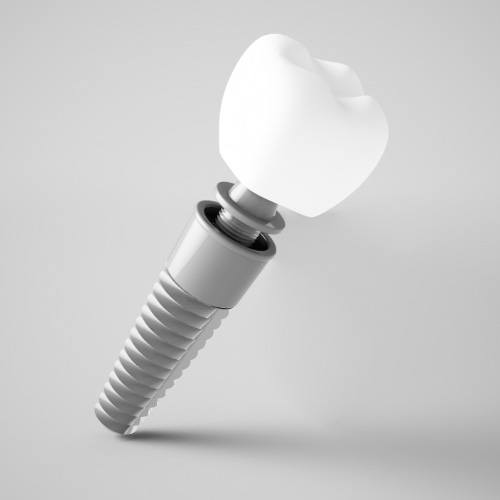
Research estimates that over 500,000 dental implants are placed in the U.S. every year! If you are considering joining this group and eliminating the gap(s) in your smile, you probably have some questions. Well, you are in luck – because we have answers! Our expert team here at Kobza Dental has compiled some of the most common questions and answers about dental implants in Falls City. If you still have questions, do not hesitate to give our team a call!
How Long Do Dental Implants Last?
Investing in dental implants is investing in the long-term health and appearance of your smile. With proper care, you can rely on your implants for two decades or more – perhaps even the rest of your life! A variety of factors can influence the longevity of your dental implants, such as:
- If you brush and floss daily and schedule preventive dental checkups every six months.
- If you avoid chewing or biting down on extremely hard items, like pens, pencils, ice cubes, and more.
- If your dentist is skilled at placing dental implants. Dr. Kobza has completed advanced training in dental implantation at the Hands-On Implant Institute.
- If you lead an overall healthy lifestyle; just because implants replace your teeth doesn’t mean they eliminate the need for making healthy choices.
Can Dental Implants Fail?
With a success rate of approximately 98%, dental implants are a reliable and effective way to replace missing teeth. In some rare cases, however, dental implant failure can occur. Regular tobacco use, diabetes, and low jawbone density can all prevent an implant from successfully fusing with the jaw through a natural process called osseointegration. When this happens, the dental implant cannot provide the stable base necessary for an artificial crown or bridge. Gum disease and other oral infections can also reduce the chances that an implant will heal properly.
Is It Safe to Get Dental Implants?
Because dental implantation involves a minor surgical procedure, many patients worry that replacing their teeth with dental implants will be an extremely painful experience. However, there is no reason to fret! Almost all dental implants are placed under a local anesthetic that numbs the mouth and prevents patients from feeling any pain. At most, you might feel some dull pressing and pushing during the procedure as well as some vibration during the drilling stage.
For more complex cases that involve multiple implants, sedation can be provided to make patients feel relaxed and at ease throughout the lengthier procedure. Sedation can also be helpful for those patients that suffer from dental anxiety.